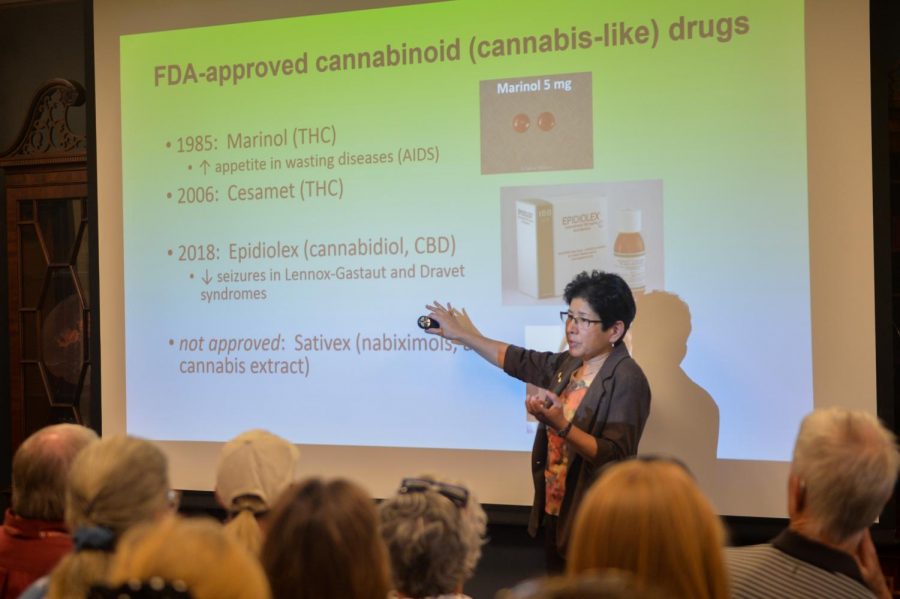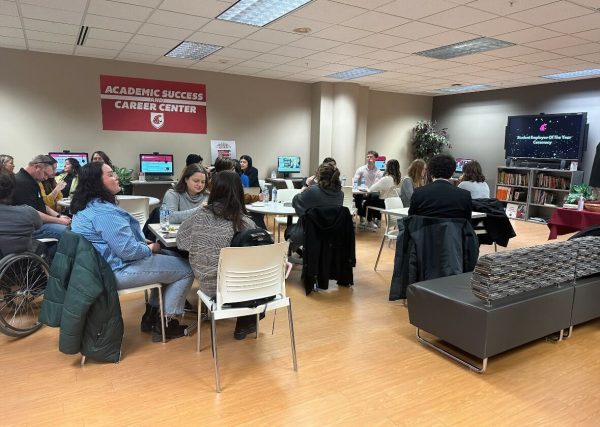Foley Talk: marijuana legalization
11 states currently allow recreational use of weed, 33 states allow medicinal
HSING-HAN CHEN | THE DAILY EVERGREEN
Rebecca Craft, a professor of psychology, speaks about marijuana and whether or not it should be considered a medical miracle on Wednesday at the Foley Speaker’s Room.
September 5, 2019
Research into marijuana has been slow to develop, but more people are for its legalization than ever. That’s what Rebecca Craft, a professor of psychology, told the crowd at her talk Wednesday afternoon at her Foley Institute talk in Bryan Hall.
Public support for the legalization of marijuana has greatly risen over the century, she said. In 1969, only 12 percent of Americans supported legalization, but in 2017 public support was at 64 percent.
“The support for marijuana legalization will continue upward,” Craft said.
She said 33 states already allow medicinal cannabis use, while 11 states allow recreational use. All but one state has legalized some form of CBD, a compound from the marijuana plant that is less psychoactive than THC.
Craft said there has also been an increase in proposals of federal marijuana legislation, many of which are related to rolling back regulations and removing cannabis from its schedule-1 DEA classification.
The DEA categorizes schedule-1 drugs as highly addictive and having no accepted medical use.
Craft said some of the reasoning behind this changing public attitude towards cannabis is because people are starting to believe it has a medicinal purpose and people are realizing how much revenue legal cannabis can bring in.
Craft said in Washington state, cannabis sales brought in $357.8 million in tax revenue during the fiscal year of 2018.
“Most of this revenue has gone towards health care,” Craft said.
She said a lot of research is being done with cannabis to determine its effectiveness in treating a wide variety of ailments including migraines, drug addiction, dementia, Alzheimer’s disease, anxiety disorders and multiple sclerosis.
“The actual science has been pretty slow to develop,” Craft said.
She said there is a tremendous biological basis within the human body for the use of cannabis as medicine. Craft said our bodies have cannabinoid systems with receptors for cannabis among many of the body’s systems, organs and tissues.
Craft also addressed concerns of increased marijuana addiction among legalization of the drug. She said while there are much lower rates of addiction with marijuana than there are with drugs like alcohol and tobacco, rates of marijuana addiction among minors are much higher.
Craft said this is probably what the government is worried about when it comes to legalization.
“Even if we restrict its use, some will still be available to youth,” Craft said.























WalStMonky • Sep 5, 2019 at 9:54 am
The CDC says that just about 40% of Americans try cannabis before they graduate from high school. Guess what? Thgat’s down fro 50% in 2010. At some point will you people quit with the nonsense that the stupidity of prohibition is actually acheiving the goals you set?